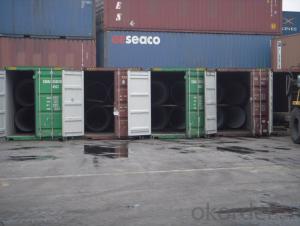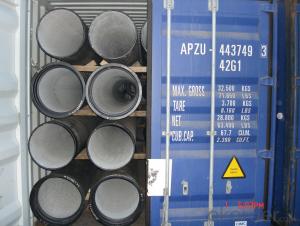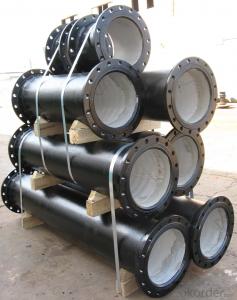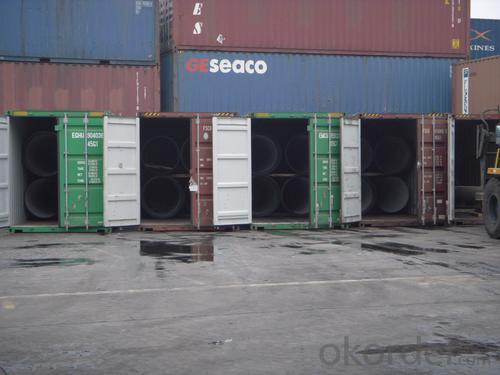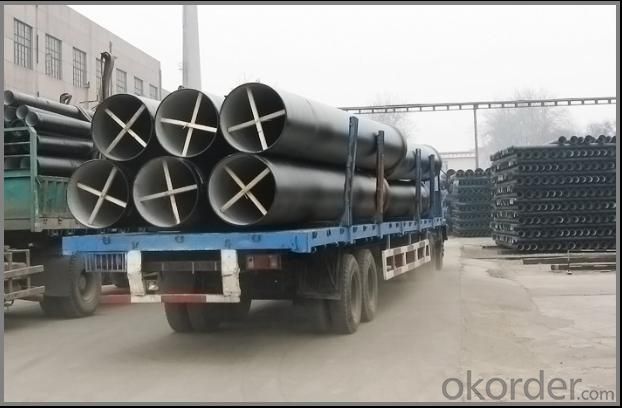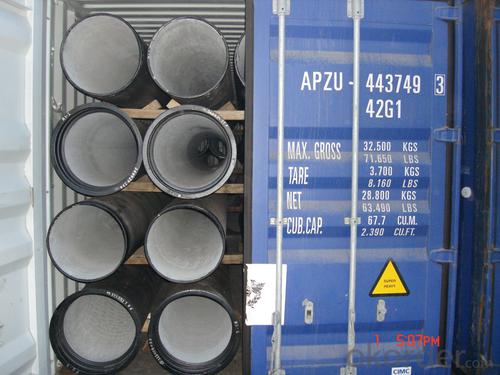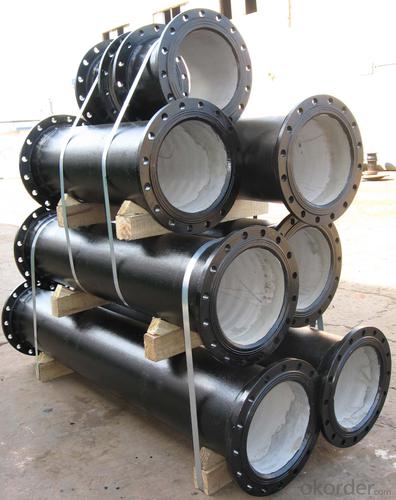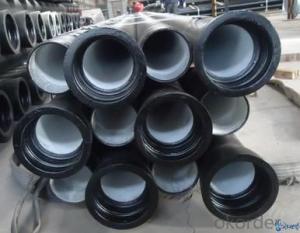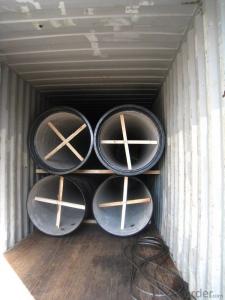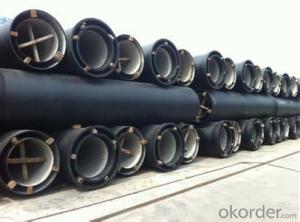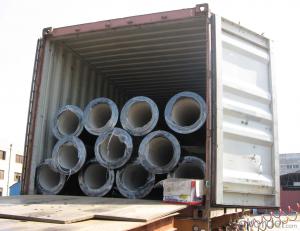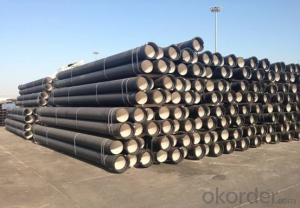DUCTILE IRON PIPES C Class DN500
- Loading Port:
- China Main Port
- Payment Terms:
- TT OR LC
- Min Order Qty:
- -
- Supply Capability:
- -
OKorder Service Pledge
OKorder Financial Service
You Might Also Like
Ductile Iron Cast Pipe is without any defects compare with tradition casting tech, which has many advantages particularly as follow:
(1) High density. In the "vertical upward casting" process, the melt iron of centre liquid column in center crystallizer is continuously feeding for volume shrinkage caused by condensation tube at outer circumference , which lead to be free of shrinkage porosity.
(2) High purity. When melt iron pouring, the mixed impurities such as gas, dross, sand grain which are lighter than melt iron could be eliminated at furnace mouth, its impossible to enter into the crystallizer through the channel, so the melt iron into the crystallizer is very pure.
(3) Strength with toughness. The cooling speed provided by continuous crystallizer is 30 times than sand casting and 5 times than centrifugal casting, and doesn't produce white iron, the eutectic cell volume of continuous cast iron is one eighth to one tenth compare with traditional cast iron. The density of graphite nodule in ductile iron can reach 300-700 pcs/mm2. Therefore, all reason above improve the strength and toughness of continuous cast iron.
(4) Free machining. The high speed cooling make the hardening phase (such as boride, steadite) not appear like reticular, massive or thick, but diffuse like fish bone and pane in shape, moreover, there are tiny graphite flakes inlaid hardening phase. It's free machining in BrinellHardness the range of 250-300HB. However, the Brinell Hardness of 250 is top limit to common metal materials.
(5) Uniform composition of tube wall. The convection mixing of liquid column caused by marching type drawing in crystallizer make the composition of tube wall well-distributed, and concentration gradient very little.
(6) High productivity. To the wall thickness of tube under 10mm, the speed of continuous casting is 1 meter/min, to the wall thickness of tube under 20mm, the speed of continuous casting is 0.5 meter/min, which is high efficiency that centrifugal or other casting tech couldn't reach.
- Q: How does ductile iron pipe perform in high-pressure gas applications?
- Due to its unique characteristics and properties, ductile iron pipe is an outstanding option for high-pressure gas applications. Firstly, its high tensile strength enables it to withstand the immense pressure exerted by gas flowing through the pipeline, ensuring leakage or rupture-free containment. Additionally, ductile iron pipe exhibits remarkable resistance to corrosion, making it ideal for gas applications that may encounter moisture, chemicals, or other corrosive substances. This corrosion resistance guarantees the pipe's longevity and minimizes the risk of damage or failure caused by corrosion. Another advantage of ductile iron pipe in high-pressure gas applications is its capability to handle thermal expansion and contraction. As gas is transported under high pressures, temperature fluctuations occur, resulting in pipeline expansion and contraction. However, ductile iron pipe's flexibility allows it to adapt to these changes without compromising its performance or structural integrity. Furthermore, ductile iron pipe's smooth interior surface reduces friction losses and pressure drops, resulting in efficient gas flow. This smoothness also reduces the likelihood of gas impurities or debris becoming trapped, potentially leading to blockages or flow disruptions. In conclusion, when it comes to high-pressure gas applications, ductile iron pipe is a dependable and durable choice. Its high tensile strength, corrosion resistance, ability to handle thermal expansion, and smooth interior surface all contribute to its exceptional performance in demanding conditions.
- Q: Is the cast iron pipe buried in need of antiseptic treatment? What kind of anticorrosive materials are used?
- It must be antiseptic. Usually hot asphalt brush painted two times, winding glass fiber cloth two road, cross construction.
- Q: Can ductile iron pipes be used for water supply in remote areas?
- Ductile iron pipes are indeed suitable for water supply in remote areas. Renowned for their strength, durability, and versatility, these pipes are capable of serving various purposes, including water supply systems. Notably, their exceptional resistance to corrosion and ability to endure harsh environmental conditions renders them an ideal choice for remote areas with limited maintenance and repair services. Moreover, in comparison to alternative materials, ductile iron pipes boast a significantly longer lifespan, ensuring the sustained operation of water supply systems in remote areas. In summary, the reliability of ductile iron pipes for water supply in remote areas is attributable to their resilience, resistance to corrosion, and extended lifespan.
- Q: Fire water supply network adopts ductile iron pipe, the test pressure should be no more than MPa
- Strictly speaking: the outer pipe network and the internal pipe network are the same. Minimum fire 1.0MPa, minimum sprinkler 1.4MPa. Because not only in accordance with the water pump, but also take into account the pressure on the fire engine.
- Q: Can ductile iron pipes be made into clear tubes?
- Of course, the cast iron pipe is suitable for being buried in the ground because of its corrosion resistance, rust resistance and non deformation.
- Q: Do ductile iron pipes require cathodic protection?
- Indeed, cathodic protection is necessary for ductile iron pipes. Employing this technique safeguards metallic structures against corrosion by designating them as the cathode in an electrochemical cell. Ductile iron pipes face a high susceptibility to corrosion, particularly in harsh soil environments or when exposed to water that harbors substantial amounts of corrosive elements like chlorides or sulfates. By subjecting the pipe to a direct electrical current, cathodic protection effectively thwarts the innate corrosion process. This approach guarantees the durability and soundness of the ductile iron pipes, thereby diminishing the frequency of repairs or replacements.
- Q: What are some common applications for ductile iron pipe?
- Ductile iron pipe, known as DI pipe, is extensively utilized in a variety of applications because of its durability, strength, and ability to resist corrosion. The following are some common uses of ductile iron pipe: 1. Water Distribution: DI pipe is widely employed in the distribution of clean water. Its high tensile strength enables it to withstand high water pressure, making it perfect for water mains, water transmission lines, and water distribution networks. 2. Sewer Systems: DI pipe is commonly utilized in sewer systems because of its corrosion resistance and ability to handle heavy loads. It is often used for gravity sewer lines, force mains, and stormwater systems. 3. Industrial Applications: DI pipe is used in various industrial settings, such as power plants, chemical plants, and refineries. It is utilized for the transportation of water, wastewater, and other fluids in these industries. 4. Irrigation Systems: Due to its strength and long lifespan, DI pipe is suitable for irrigation systems, particularly in agricultural areas. It is used to transport water for irrigation purposes, ensuring efficient water distribution in fields and farms. 5. Fire Protection Systems: DI pipe is commonly employed in fire protection systems, including fire hydrants, fire sprinkler systems, and fire suppression systems. Its robustness and ability to withstand high pressure make it an excellent choice for reliable and effective fire protection. 6. Pumping Stations: DI pipe is frequently utilized in pumping stations, which are crucial for various water-related applications. It is used in water intake systems, wastewater pumping stations, and water treatment plants to efficiently transport water and wastewater. 7. Municipal Infrastructure: DI pipe is widely used in municipal infrastructure projects, such as road drainage systems, culverts, and bridge crossings. Its strength, durability, and ability to withstand external loads make it suitable for these applications. 8. Gas Distribution: Although primarily used for water-related applications, DI pipe is also utilized for the distribution of natural gas and other gases. It is preferred for gas distribution due to its resistance to corrosion and ability to withstand high-pressure environments. In conclusion, ductile iron pipe has a wide range of applications and is preferred in situations that require strength, durability, and resistance to corrosion. Its versatility and reliability make it a popular choice for various infrastructure projects and industrial applications.
- Q: Are ductile iron pipes suitable for sewer force mains?
- Yes, ductile iron pipes are suitable for sewer force mains. They have proven to be a reliable and durable choice for transporting wastewater under pressure. Their high tensile strength and resistance to corrosion make them ideal for withstanding the demanding conditions of sewer force mains.
- Q: Can ductile iron pipes be used for road and highway drainage?
- Yes, ductile iron pipes can be used for road and highway drainage. Ductile iron pipes have excellent strength and durability, making them suitable for use in various applications, including drainage systems. They have high tensile strength and can withstand heavy loads and traffic, making them ideal for road and highway drainage where constant vehicle movement is expected. Ductile iron pipes are also resistant to corrosion and offer a long service life, reducing maintenance and replacement costs. Additionally, their smooth inner surface allows for efficient water flow, preventing waterlogging and ensuring proper drainage. Therefore, ductile iron pipes are a reliable and effective choice for road and highway drainage systems.
- Q: Can ductile iron pipes be used for stormwater drainage systems?
- Indeed, stormwater drainage systems can utilize ductile iron pipes. These pipes are renowned for their strength, durability, and resistance to corrosion, rendering them appropriate for various applications, including stormwater drainage. They possess the capacity to accommodate substantial water flow and endure heavy traffic loads, making them a reliable selection for stormwater management. Moreover, ductile iron pipes exhibit exceptional joint performance, guaranteeing a watertight and secure connection, a critical aspect in preventing leaks and preserving the integrity of the stormwater drainage system. All in all, due to their sturdiness, longevity, and ability to withstand the challenging conditions typically associated with stormwater management, ductile iron pipes present a viable choice for stormwater drainage systems.
Send your message to us
DUCTILE IRON PIPES C Class DN500
- Loading Port:
- China Main Port
- Payment Terms:
- TT OR LC
- Min Order Qty:
- -
- Supply Capability:
- -
OKorder Service Pledge
OKorder Financial Service
Similar products
Hot products
Hot Searches
Related keywords
